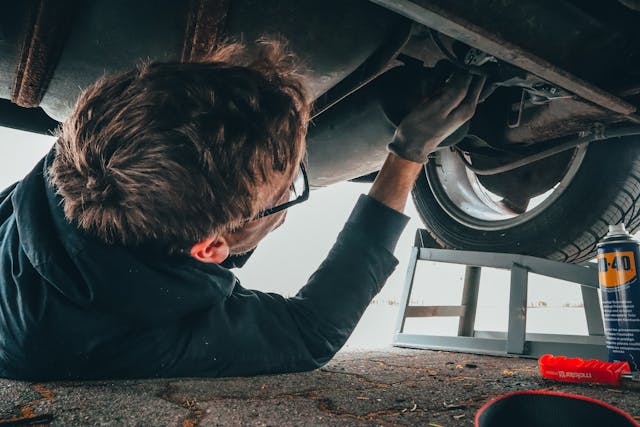When you’re facing car troubles, knowing who to call can save you both time and money. This article breaks down the key differences between auto electricians and general mechanics, helping New Zealand drivers choose the right professional for their specific automotive issues. We’ll cover their respective skills, job functions, and real-world examples to make this distinction clear.
The Main Difference Between Auto Electricians and General Mechanics
Primary Focus of Work
The primary distinction between an auto electrician and a general mechanic lies in their area of specialisation. Auto electricians focus on diagnosing, repairing, and installing electrical systems and components in vehicles. This includes tasks such as fixing wiring faults, replacing alternators, and installing car alarms or GPS systems.
On the other hand, general mechanics—also known as automotive technicians—handle the broader mechanical components of a vehicle. They work on engines, brakes, transmissions, suspension systems, and other mechanical parts that affect the car’s movement and performance.
Types of Problems They Handle
If your car won’t start and it’s not a battery issue, chances are an auto electrician is needed. They are often called in when dashboard warning lights appear, when the vehicle’s internal electronics (like the stereo, sensors, or onboard computer) malfunction, or when electric windows and central locking fail.
General mechanics usually deal with noises under the hood, overheating engines, oil leaks, worn-out brake pads, and steering issues. Essentially, if the issue is mechanical rather than electrical, then it falls within a mechanic’s territory.
Tools and Equipment Used
Auto electricians use specialised diagnostic tools such as multimeters, scan tools, and oscilloscopes to test electrical circuits and computer systems. These tools allow them to detect current flow issues, voltage drops, and software malfunctions within the vehicle.
On the flip side, general mechanics rely more on physical tools like wrenches, jacks, torque tools, and lifts to work on the engine and body of the car. While they may use some electrical diagnostic tools, their main equipment is geared toward mechanical repair.
Training and Qualifications
Training Pathways in New Zealand
In New Zealand, both auto electricians and general mechanics typically begin their careers through apprenticeships. However, each profession follows a different training route. For general mechanics, the National Certificate in Automotive Engineering (Level 4) is a common qualification. This provides a solid grounding in engine diagnostics, service, and repair.
Auto electricians usually pursue the National Certificate in Motor Industry (Automotive Electrical and Mechanical Engineering) or a specialised automotive electrical course. Their training goes deeper into vehicle electronics and often includes modules on computer-based vehicle systems.
Ongoing Certification and Specialisation
As vehicle technology evolves, especially with the rise of electric and hybrid vehicles, ongoing training becomes crucial. Auto electricians often undergo continuous education to keep up with the latest diagnostics and high-voltage systems, which are not typically part of a general mechanic’s training.
Some general mechanics may cross-train to handle minor electrical issues, but for complex diagnostics and tasks related to sensors, ECUs (Electronic Control Units), and battery management systems, an experienced auto electrician is the safer bet.
Common Services Performed by Each Trade
Auto Electrician Services
Auto electricians in New Zealand are commonly called for:
- Battery replacement and diagnostics
- Starter motor and alternator repairs
- Trailer and caravan wiring
- Airbag and ABS system diagnostics
- Alarm, immobiliser, and GPS tracking system installations
- EV and hybrid diagnostics
- Central locking and power window faults
General Mechanic Services
General mechanics are typically responsible for:
- Engine repairs and rebuilds
- Brake and clutch replacements
- Exhaust system repairs
- Tyre alignments and balancing
- Transmission servicing
- Oil changes and routine maintenance
- Cooling system repairs
Overlap Between the Two Professions
When Both Are Needed
Modern vehicles are more reliant on electronics than ever, creating more overlap between general mechanics and auto electricians. A broken ABS system, for example, may require both mechanical and electrical repairs. Similarly, engine faults may trigger warning lights that a general mechanic can diagnose but not fully repair without electrical expertise.
In these cases, workshops may have both a general mechanic and an auto electrician on staff, or they may refer the client to a specialist. This collaborative approach ensures that all aspects of the vehicle’s issues are corrected efficiently and accurately.
Hybrid Vehicles and EVs
With the increasing number of hybrid and electric vehicles in New Zealand, this overlap becomes more pronounced. These vehicles rely heavily on complex electrical systems. As a result, general mechanics may not be fully equipped to diagnose or repair such systems, making the role of a specialist auto electrician even more critical.
For example, replacing a high-voltage battery in an EV is a complex task that requires proper safety protocols and advanced training—well beyond the scope of traditional mechanical work.
The Importance of Getting the Right Expert
Time and Cost Savings
Calling the right professional from the start can save time and avoid unnecessary labour costs. If your car alarm won’t stop going off, hiring a general mechanic first may result in a referral to an auto electrician anyway. Similarly, if your vehicle is experiencing jerky movement or engine knocks, an electrician won’t be able to help with those mechanical issues.
Making the right choice upfront means faster repairs and fewer diagnostic charges. It also ensures the correct tools and replacement parts are used, particularly when dealing with sensitive electronics or advanced safety systems.
Safety Considerations
Vehicle electronics such as airbags, anti-lock braking systems, and even electric seatbelt pretensioners require precise diagnostics and repairs. Mistakes in these areas can compromise vehicle safety. This is why these systems are best handled by trained auto electricians.
Similarly, mechanical faults that aren’t treated properly can lead to breakdowns, poor fuel efficiency, or even accidents on New Zealand’s roads. A qualified general mechanic ensures that your vehicle is mechanically sound, road legal, and comfortable to drive.
When to Choose an Auto Electrician Over a General Mechanic
Dashboard Warning Lights
If your dashboard lights are flickering or certain warning lights (like airbag or ABS) stay on, an auto electrician is your go-to professional. These issues often relate to wiring faults or sensor failures, which require advanced diagnostics.
Non-Starting Vehicles with Electrical Symptoms
Cars that won’t start might have either mechanical or electrical causes. However, if you’ve recently had a flat battery, or you notice your starter motor turning weakly, it’s more likely an issue for an auto electrician to resolve.
Aftermarket Installations
Whether it’s a new stereo system, reversing camera, or LED lighting upgrade, you’d want an auto electrician to handle these installations. Proper wiring and connection are essential to ensure that the add-ons function smoothly without compromising the car’s existing systems.
Need Help Knowing Who to Call?
We understand how confusing it can be to know whether to call an auto electrician or a general mechanic, especially when modern vehicles can have problems that cross both electrical and mechanical domains. Pay close attention to the type of issue you’re experiencing—whether it’s functional or related to electronics—and make your decision accordingly.
If unsure, a reputable workshop like Eurosparx can diagnose the issue and advise you on the right course of action. We offer expert auto electrical services, ensuring that everything from battery faults to complex diagnostics is dealt with accurately and efficiently.
Need Help With Vehicle Electrical Issues?
Now that you understand the difference between an auto electrician and a general mechanic, you’ll be better equipped to choose the right professional when your car starts acting up. Remember, electrical issues are best left to the experts.
As trusted auto electricians in New Zealand, Eurosparx is here to help with all your vehicle’s electrical needs. Contact our team today by calling 09 218 7789.


